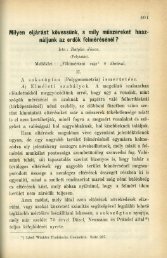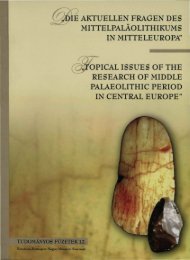Hungarian-Mesopotamian Dictionary (HMD)
Hungarian-Mesopotamian Dictionary (HMD)
Hungarian-Mesopotamian Dictionary (HMD)
Create successful ePaper yourself
Turn your PDF publications into a flip-book with our unique Google optimized e-Paper software.
ALFRÉD TÓTH : HUNGARIAN-MESOPOTAMIAN DICTIONARY (<strong>HMD</strong>)<br />
<strong>Hungarian</strong><br />
Proto-Ugric<br />
Sumerian<br />
<strong>Hungarian</strong><br />
Sumerian<br />
<strong>Hungarian</strong><br />
Chagatai, Osman<br />
Chuvash<br />
Sumerian<br />
<strong>Hungarian</strong><br />
Proto-Uralic<br />
Sumerian<br />
<strong>Hungarian</strong><br />
Sumerian<br />
Akkadian<br />
<strong>Hungarian</strong><br />
Proto-Uralic<br />
Sumerian<br />
<strong>Hungarian</strong><br />
Proto-Altaic<br />
Proto-Turkic<br />
Proto-Tungusic<br />
Proto-(Finno?-)Ugric<br />
Sumerian<br />
<strong>Hungarian</strong><br />
Proto-Uralic<br />
Sumerian<br />
sütni “to bake, to broil; to shine (sun)”; sülni “to be baked, to be boiled”<br />
*čittз- “to bake, to broil; to shine”<br />
zil (4x: Old Babylonian) wr. zil “to boil”. So, sülni and not sütni (as assumed by<br />
EWU, p. 1375) is the basic word, sütni is derived with the usual causative<br />
suffix –t-, while the –l belongs to the root, as the Sum. form shows. Thus, the<br />
problem with –tt- > -t- as well as the explication of the –l- in sülni as analogy<br />
given by EWU are mistaken, and so is the PU form.<br />
süv “uncle; brother-in-law”<br />
ušbar (19x: ED IIIa, Old Babylonian) wr. ušbar; ušbar3; ušbar2 "father-in-law;<br />
mother-in-law"<br />
süveg “high (fur-)cap”<br />
jelek “ruling hat”<br />
∂sl∂k, ∂śl∂k, š∂l’∂k<br />
dul (260x: ED IIIb, Ur III, Old Babylonian) wr. dul; dul9; dul5; dulx(DUN3)<br />
“to cover”<br />
-sz (present tense suffix, e.g. e-sz-ik “eats”)<br />
*-ś (durative/deperfectivizing derivational suffix)<br />
-eš/-éš (suffix of the 3rd person of pl.)<br />
szabni “to cut”<br />
šab (25x: Old Babylonian) wr. šab “to incise; to trim; to cut, fell (of trees)”<br />
esēpum<br />
szád “river-mouth”, száj “mouth”<br />
*śuwe<br />
sub (126x: Ur III, Old Babylonian) wr. su-ub; sub; sub6 “to suck; to rub”<br />
szádok(fa), száldok, szaldék(fa) “linden tree” (fa “tree”)<br />
*č’ali “membrane; bark”<br />
*čel-<br />
*čal-<br />
*śal’з “tree-bark”<br />
asal (338x: ED IIIb, Old Akkadian, Ur III, Early Old Babylonian, Old<br />
Babylonian) wr. ĝešasal2; ĝešasalx(|A.TU.NUN&NUN|); ĝešasalx(ASAL2~a);<br />
ĝešasalx(|A.TU|); ĝešasalx(|A.TU.GABA.SIG.GAR|) “poplar”<br />
szag “odour, scent, smell”<br />
*śaŋkз(-) “odour, taste; to smell, to taste”<br />
zig (8574x: Lagash II, Ur III) wr. zig3 “to swell; to expend; to rise”.<br />
Semantically, cf. s.v. illik, illat.<br />
___________________________________________________________________________________<br />
© Copyright Mikes International 2001-2007, Alfréd Tóth 2007 - 115 -


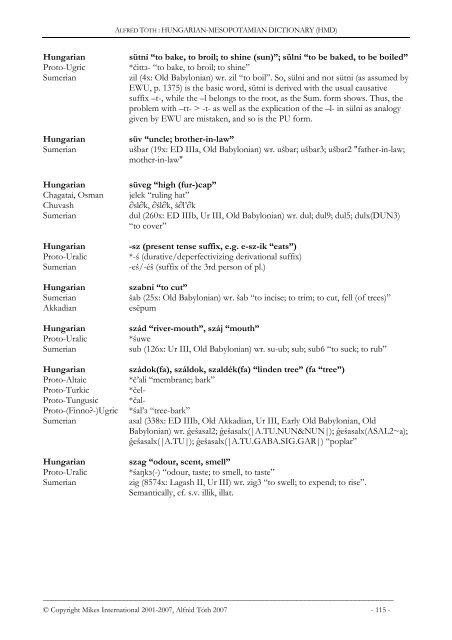
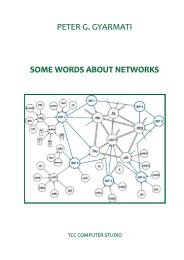

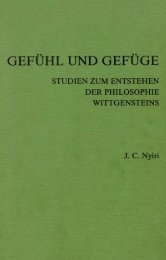
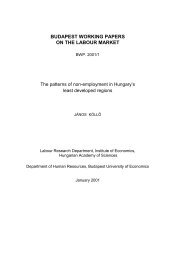

![Letöltés egy fájlban [4.3 MB - PDF]](https://img.yumpu.com/50159926/1/180x260/letaltacs-egy-fajlban-43-mb-pdf.jpg?quality=85)

